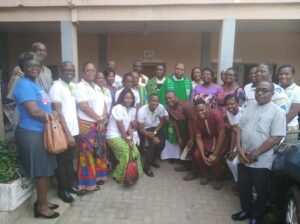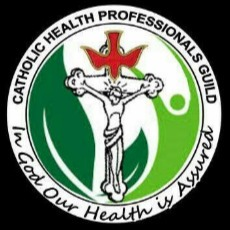In commemoration of the 30th World Day of the Sick, the Catholic Health Professionals Guild of the Catholic Archdiocese of Accra, are poised to mark this day with activities including a Mass on Sunday, February 13, 2022 at the St. Margaret Mary Parish at Dansoman at 7:00am.
The World Day of the Sick celebrated on every February 11 is an awareness day, or observance, in the Catholic Church intended for “prayer and sharing, of offering one’s suffering for the good of the Church and of reminding everyone to see in his sick brother or sister the face of Christ”.
According to a notice by the Guild made available to newswatchgh.com, as part of the Mass, there would be the inauguration of St. Margaret Mary Parish Guild and a visit to the Mamprobi Hospital on Sunday, February 13 at 10:00am.
In order to effectively mark the day, the leadership of the Catholic Health Professionals Guild is encouraging all Catholic Health practitioners to participate in the activities put together to commemorate the day.
February 11 is World Day of the Sick, an observation started by Pope John Paul II as a way for believers to offer prayers for those suffering from illnesses. The day coincides with the commemoration of Our Lady of Lourdes.

People around the world take the time to pray for the sick and for those who work very hard to alleviate the sufferings of the sick on this day. Faith organisations mark this day especially to provide the sick with medicines, food, and spiritual guidance.
Pope John Paul II initiated the day in 1992 to encourage people to pray for those who suffer from illness and for their caregivers. The Pope himself had been diagnosed with Parkinson’s a year before, in 1991, and it is considered that his own illness was impetus for his designation of the day.
Pope Benedict XVI also declared his decision to resign from his post as the Pope on this day in 2013. He cited his failing health as the reason behind his decision.
In his message for the 30th World Day of the Sick, entitled “Be merciful, even as your Father is merciful” (Lk 6:36). Standing beside those who suffer on a path of charity, Pope Francis said, “Jesus’ invitation to be merciful like the Father – writes the Pope – has particular significance for healthcare workers. I think of all those physicians, nurses, laboratory technicians, the support staff and the caretakers of the sick, as well as the numerous volunteers who donate their precious time to assist those who suffer”. People who have made their service a mission. Because Your hands, which touch the suffering flesh of Christ, can be a sign of the merciful hands of the Father”.
The Pontiff recalls “the progress that medical science has made, especially in recent times; new technologies have made it possible to prepare therapies that are of great benefit to the sick; research continues to make a valuable contribution to eliminating old and new pathologies; rehabilitation medicine has greatly expanded its expertise and skills. None of this, however, must make us forget the uniqueness of each patient, his or her dignity and frailties”.
However, He issues a warning and calls for the patient to always be treated as a person with his own dignity. “None of this, however, must make us forget the uniqueness of each patient, his or her dignity and frailties. Patients are always more important than their diseases, and for this reason, no therapeutic approach can prescind from listening to the patient, his or her history, anxieties and fears. Even when healing is not possible, care can always be given. It is always possible to console, it is always possible to make people sense a closeness that is more interested in the person than in his or her pathology”.
He reiterated the importance of Catholic healthcare institutions and their commitment to caring for and treating people. “At a time in which the culture of waste is widespread and life is not always acknowledged as worthy of being welcomed and lived, these structures, like “houses of mercy”, can be exemplary in protecting and caring for all life, even the most fragile, from its beginning until its natural end”.
Pope Francis concluded by recalling the indispensable service of the health care ministry, especially in spiritual assistance to the sick, and the commitment that each of us should have in making ourselves close to those who suffer. Because “the ministry of consolation is a task for every baptized person, mindful of the word of Jesus: “I was sick and you visited me” ( Mt 25:36)”.



